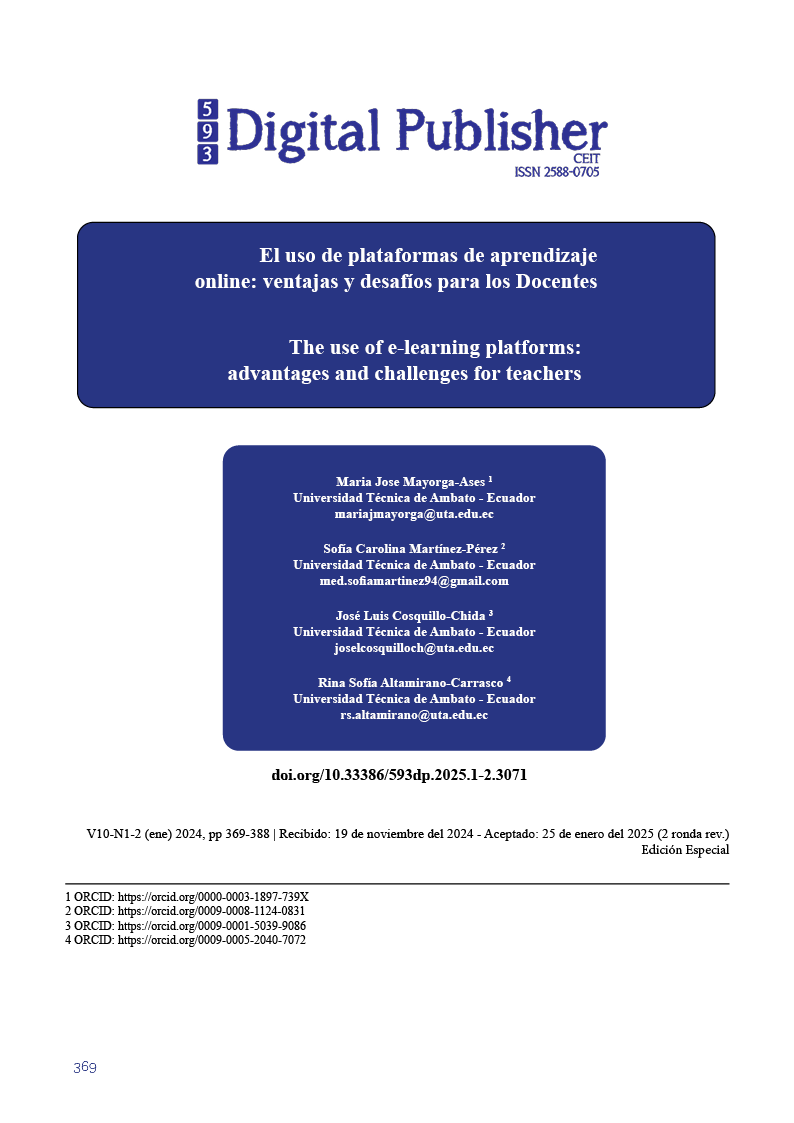El uso de plataformas de aprendizaje online: ventajas y desafíos para los Docentes
Contenido principal del artículo
Resumen
La presente investigación denominada el uso de plataformas de aprendizaje online: ventajas y desafíos para los Docentes, analiza cómo las plataformas digitales han transformado la educación, facilitando el acceso a contenidos educativos y la interacción entre docentes y estudiantes. Una de las principales ventajas es la flexibilidad que ofrecen estas plataformas, permitiendo a los docentes adaptar los materiales a las necesidades de los estudiantes y promover un aprendizaje personalizado. Además, fomentan la autonomía del alumno, quien puede acceder a los recursos en cualquier momento y desde cualquier lugar. Sin embargo, también existen varios desafíos que enfrentan los docentes al utilizar estas herramientas. Uno de los principales problemas es la falta de capacitación adecuada, lo que puede dificultar la integración eficaz de la tecnología en el aula. Además, algunas plataformas requieren una infraestructura tecnológica avanzada, lo que puede ser una barrera en contextos con limitados recursos. A pesar de estos obstáculos, el uso de plataformas de aprendizaje online sigue siendo una tendencia creciente, debido a su potencial para mejorar la enseñanza y el aprendizaje, si se abordan correctamente sus limitaciones.
Descargas
Detalles del artículo

Esta obra está bajo una licencia internacional Creative Commons Atribución-NoComercial-CompartirIgual 4.0.
1. Derechos de autor
Las obras que se publican en 593 Digital Publisher CEIT están sujetas a los siguientes términos:
1.1. 593 Digital Publisher CEIT, conserva los derechos patrimoniales (copyright) de las obras publicadas, favorece y permite la reutilización de las mismas bajo la licencia Licencia Creative Commons 4.0 de Reconocimiento-NoComercial-CompartirIgual 4.0, por lo cual se pueden copiar, usar, difundir, transmitir y exponer públicamente, siempre que:
1.1.a. Se cite la autoría y fuente original de su publicación (revista, editorial, URL).
1.1.b. No se usen para fines comerciales u onerosos.
1.1.c. Se mencione la existencia y especificaciones de esta licencia de uso.
Citas
Abbas, U., Parveen, M., Sahito, F. S., Hussain, N., & Munir, S. (2024). E-learning in medical education: a perspective of pre-clinical medical students from a lower-middle income country. BMC Medical Education, 24(1), 162. https://doi.org/10.1186/s12909-024-05158-y
Abu-Salih, B., Qudah, D. Al, Al-Hassan, M., Ghafari, S. M., Issa, T., Aljarah, I., Beheshti, A., & Alqahtani, S. (2024). An intelligent system for multi-topic social spam detection in microblogging. Journal of Information Science, 50(6), 1471–1498. https://doi.org/10.1177/01655515221124062
Al-khresheh, M. H., & Alkursheh, T. O. (2024). An integrated model exploring the relationship between self-efficacy, technology integration via Blackboard, English proficiency, and Saudi EFL students’ academic achievement. Humanities and Social Sciences Communications, 11(1), 287. https://doi.org/10.1057/s41599-024-02783-2
Almusharraf, A. I. (2024). An Investigation of University Students’ Perceptions of Learning Management Systems: Insights for Enhancing Usability and Engagement. Sustainability (Switzerland), 16(22), 10037. https://doi.org/10.3390/su162210037
Assad, A., Kaleel, A., Zainal, I., & Wadood, R. (2024). Practicing Netiquette in Online Communication Between Students and Professors in Higher Education: A Systematic Review. Studies in Media and Communication, 12(4), 65–78. https://doi.org/10.11114/smc.v12i4.6903
Bashir, S., & Lapshun, A. L. (2025). E-learning future trends in higher education in the 2020s and beyond. Cogent Education, 12(1), 2445331. https://doi.org/10.1080/2331186X.2024.2445331
Beaugeard, E., Cho, H. D., & Koo, C. (2025). When K-drama fiction becomes reality: the French perspective. Current Issues in Tourism. https://doi.org/10.1080/13683500.2024.2448495
Chanaa, A., & El Faddouli, N. E. (2024). Prerequisites-based course recommendation: recommending learning objects using concept prerequisites and metadata matching. Smart Learning Environments, 11(1), 16. https://doi.org/10.1186/s40561-024-00301-0
Dávila, C. A. H., Hernández, R. S. V., Ases, L. A. M., & Salto, S. V. H. Del. (2023). Métodos de enseñanza del razonamiento lógico matemático para estudiantes universitarios. AlfaPublicaciones, 5(4), 33–48. https://doi.org/10.33262/ap.v5i4.409
Denojean-Mairet, M., López-Pernas, S., Agbo, F. J., & Tedre, M. (2024). A literature review on the integration of microlearning and social media. Smart Learning Environments, 11(1), 46. https://doi.org/10.1186/s40561-024-00334-5
Ding, R., & Cheng, H. (2024). Improving undergraduate education of occupational health and occupational medicine appling massive open online courses & problem-based learning. BMC Medical Education, 24(1), 188. https://doi.org/10.1186/s12909-024-05179-7
Eltahir, M. E., & Babiker, F. M. E. (2024). The Influence of Artificial Intelligence Tools on Student Performance in e-Learning Environments: Case Study. Electronic Journal of E-Learning, 22(9), 91–110. https://doi.org/10.34190/ejel.22.9.3639
Hu, L., Li, S., & Zhou, L. (2024). Effect of Tronclass combined with team-based learning on nursing students’ self-directed learning and academic performance: a pretest-posttest study. BMC Medical Education, 24(1), 752. https://doi.org/10.1186/s12909-024-05741-3
Karimian, Z., & Chahartangi, F. (2024). Development and validation of a questionnaire to measure educational agility: a psychometric assessment using exploratory factor analysis. BMC Medical Education, 24(1), 1284. https://doi.org/10.1186/s12909-024-06307-z
Kerac, J., Golubović, G., Milić Keresteš, N., & Ilić, T. (2025). The Effects of Avatar Design on E-Learning: A Review. In Springer Series in Design and Innovation (Vol. 51, pp. 673–686). Springer Nature. https://doi.org/10.1007/978-3-031-77566-6_49
Khan, A., & Ali, R. (2024). Unraveling minds in the digital era: a review on mapping mental health disorders through machine learning techniques using online social media. Social Network Analysis and Mining, 14(1), 78. https://doi.org/10.1007/s13278-024-01205-0
Lara Satán, A. A., Satán, N. L., Velastegui Hernández, R. S., & Pullas Tapia, P. S. (2020). Organization and management in the prevention of occupational psychosocial risks in urban public transport. Universidad y Sociedad, 12(4).
Liu, Y. H., Chen, S. F., & Wen, D. W. (Marian). (2025). Automatic retrieval of health case reports for public needs using deep learning techniques. Aslib Journal of Information Management, 77(1), 27–46. https://doi.org/10.1108/AJIM-01-2023-0002
Maciejowska, I. (2024). Implementation of the course “good chemistry: methodological, ethical and social implications” - a case study. Chemistry Teacher International, 6(4), 359–371. https://doi.org/10.1515/cti-2024-0019
Meyer, B., Riedel, F., Amann, N., Graf, A., Stuehrenberg, A., Ritter, V., Wallwiener, M., Heublein, S., Recker, F., Weiss, M., & Riedel, M. (2024). Exploring the current state of clinical and practical teaching in obstetrics and gynecology in the era of competency-based education: a nationwide survey among German teaching coordinators. BMC Medical Education, 24(1), 165. https://doi.org/10.1186/s12909-024-05138-2
Min, S., & Atan, N. A. (2024). Students’ Performance and Perceptions of Authentic E-Learning Activities in English Intercultural Learning. Indian Journal of Information Sources and Services, 14(4), 92–102. https://doi.org/10.51983/ijiss-2024.14.4.15
Moher, D., Liberati, A., Tetzlaff, J., Altman, D. G., Antes, G., Atkins, D., Barbour, V., Barrowman, N., Berlin, J. A., Clark, J., Clarke, M., Cook, D., D’Amico, R., Deeks, J. J., Devereaux, P. J., Dickersin, K., Egger, M., Ernst, E., Gøtzsche, P. C., … Tugwell, P. (2009). Preferred Reporting Items for Systematic Reviews and Meta-Analyses: The PRISMA Statement. PLOS Medicine, 6(7), e1000097. https://doi.org/10.1371/JOURNAL.PMED.1000097
Mukamana, A., Byungura, J. C., Manirakiza, F., & Rushingabigwi, G. (2024). Knowledge, usability and challenges of e-learning platforms for continuing Professional Development of healthcare professionals at University Teaching Hospital of Kigali. BMC Medical Education, 24(1), 613. https://doi.org/10.1186/s12909-024-05585-x
Nokkaew, M., Nongpong, K., Yeophantong, T., Ploykitikoon, P., Arjharn, W., Siritaratiwat, A., Narkglom, S., Wongsinlatam, W., Remsungnen, T., Namvong, A., & Surawanitkun, C. (2024). Analyzing online public opinion on Thailand-China high-speed train and Laos-China railway mega-projects using advanced machine learning for sentiment analysis. Social Network Analysis and Mining, 14(1), 15. https://doi.org/10.1007/s13278-023-01168-8
Ovtšarenko, O. (2024). Opportunities of machine learning algorithms for education. Discover Education, 3(1), 209. https://doi.org/10.1007/s44217-024-00313-5
Palanci, A., Yılmaz, R. M., & Turan, Z. (2024). Learning analytics in distance education: A systematic review study. Education and Information Technologies, 29(17), 22629–22650. https://doi.org/10.1007/s10639-024-12737-5
Pham Thi, T. D., & Duong, N. T. (2024). E-learning behavioral intention among college students: A comparative study. Education and Information Technologies, 29(14), 18233–18255. https://doi.org/10.1007/s10639-024-12592-4
Rahman, H., Wahid, S. A., Ahmad, F., & Ali, N. (2024). Game-based learning in metaverse: Virtual chemistry classroom for chemical bonding for remote education. Education and Information Technologies, 29(15), 19595–19619. https://doi.org/10.1007/s10639-024-12575-5
Reina Sánchez, K., Vaca Serrano, G., Arbáizar Gómez, J. P., & Duran-Heras, A. (2025). Uncovering suggestions in MOOC discussion forums: a transformer-based approach. Artificial Intelligence Review, 58(1), 4. https://doi.org/10.1007/s10462-024-10997-8
Santiago Velastegui-Hernández, R., Tagua-Moyolema, A. E., Cumandá, X., -López, M., & Germán Muyulema-Muyulema, D. (2024). Análisis de la relación entre el uso de tecnologías educativas y el rendimiento académico de los estudiantes universitarios. 593 Digital Publisher CEIT, 9(4–1), 184–195. https://doi.org/10.33386/593dp.2024.4-1.2738
Shadiev, R., Chen, X., Reynolds, B. L., Song, Y., & Altinay, F. (2024). Facilitating cognitive development and addressing stereotypes with a cross-cultural learning activity supported by interactive 360-degree video technology. British Journal of Educational Technology, 55(6), 2668–2696. https://doi.org/10.1111/bjet.13461
Singaram, V. S., Bagwandeen, C. I., Abraham, R. M., Baboolal, S., & Sofika, D. N. A. (2022). Use of digital technology to give and receive feedback in clinical training: a scoping review protocol. Systematic Reviews, 11(1), 268. https://doi.org/10.1186/s13643-022-02151-8
Sullivan, C. C., O’Leary, D. M., Boland, F. M., Condron, C. M., Mulhall, C. M., & Eppich, W. J. (2024). A comparative analysis of student, educator, and simulated parent ratings of video-recorded medical student consultations in pediatrics. Advances in Simulation, 9(1), 10. https://doi.org/10.1186/s41077-024-00282-7
Tricco, A. C., Lillie, E., Zarin, W., O’Brien, K. K., Colquhoun, H., Levac, D., Moher, D., Peters, M. D. J., Horsley, T., Weeks, L., Hempel, S., Akl, E. A., Chang, C., McGowan, J., Stewart, L., Hartling, L., Aldcroft, A., Wilson, M. G., Garritty, C., … Straus, S. E. (2018). PRISMA extension for scoping reviews (PRISMA-ScR): Checklist and explanation. Annals of Internal Medicine, 169(7), 467–473. https://doi.org/10.7326/M18-0850/SUPPL_FILE/M18-0850_SUPPLEMENT.PDF
Valtolina, S., Matamoros, R. A., & Epifania, F. (2024). Design of a conversational recommender system in education. User Modeling and User-Adapted Interaction, 34(5), 1613–1641. https://doi.org/10.1007/s11257-024-09397-y
Velastegui, R., Poler, R., & Díaz-Madroñero, M. (2023). Aplicación de algoritmos de aprendizaje automático a sistemas robóticos multiagente para la programación y control de operaciones productivas y logísticas: una revisión de la literatura reciente. Dirección y Organización, 0(80), 60–70. https://doi.org/10.37610/DYO.V0I80.643
Velastegui, R., Poler, R., & Diaz-Madroñero, M. (2023). Conceptual model for scheduling and control of production and logistics operations using multi-agent robotic systems and blockchain. DYNA, 98(3), 307–313. https://doi.org/10.6036/10724
Velastegui, R., Poler, R., & Díaz-Madroñero, M. (2025). Revolutionising industrial operations: The synergy of multiagent robotic systems and blockchain technology in operations planning and control. Expert Systems with Applications, 269, 126460. https://doi.org/10.1016/J.ESWA.2025.126460
Venkatesh Naik, N., & Madhavi, K. (2024). Collaborative E-Learning Application with Course Recommendation in Cloud Computing. Journal of Information and Knowledge Management, 23(6), 2450088. https://doi.org/10.1142/S0219649224500886
Wahjusaputri, S., Nastiti, T. I., Bunyamin, & Sukmawati, W. (2024). Development of artificial intelligence-based teaching factory in vocational high schools in Central Java Province. Journal of Education and Learning, 18(4), 1234–1245. https://doi.org/10.11591/edulearn.v18i4.21422
Wienand, M., Wulfert, T., & Hoang, H. (2024). Design principles for e-learning platforms featuring higher-education students’ enterprise systems end-user training. Discover Education, 3(1), 82. https://doi.org/10.1007/s44217-024-00165-z
Yang, H. (2024). E-learning platforms in ideological and political education at universities: students’ motivation and learning performance. BMC Medical Education, 24(1), 628. https://doi.org/10.1186/s12909-024-05572-2
Yu, S., Androsov, A., Yan, H., & Chen, Y. (2024). Bridging computer and education sciences: A systematic review of automated emotion recognition in online learning environments. Computers and Education, 220, 105111. https://doi.org/10.1016/j.compedu.2024.105111
Yürüm, O. R., Taşkaya-Temizel, T., & Yıldırım, S. (2024). Predictive Video Analytics in Online Courses: A Systematic Literature Review. Technology, Knowledge and Learning, 29(4), 1907–1937. https://doi.org/10.1007/s10758-023-09697-z





